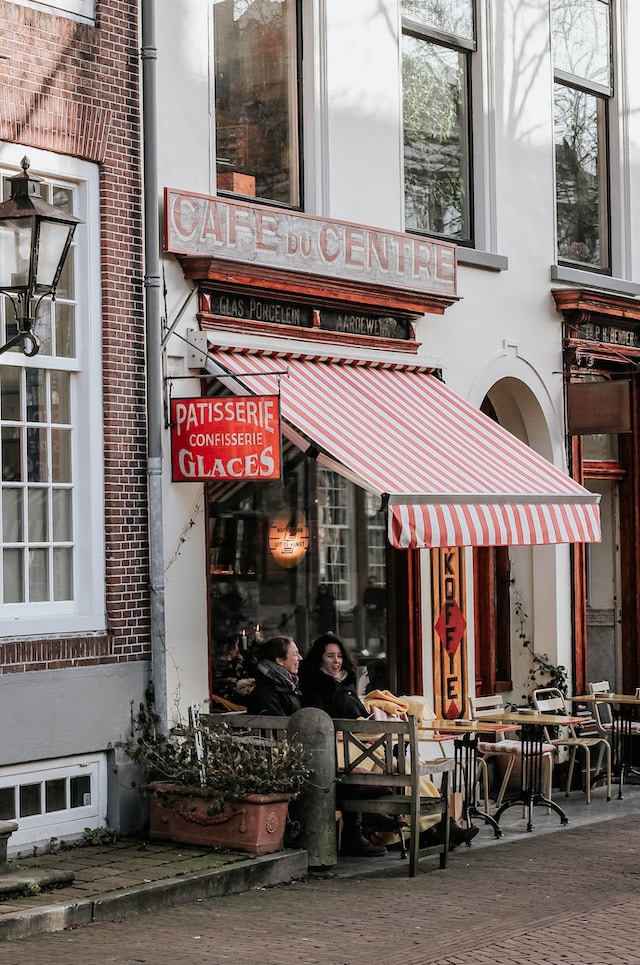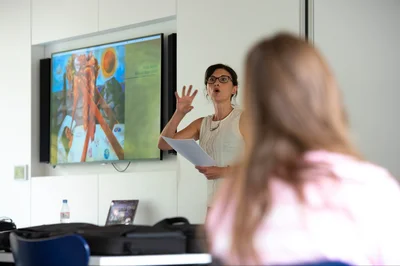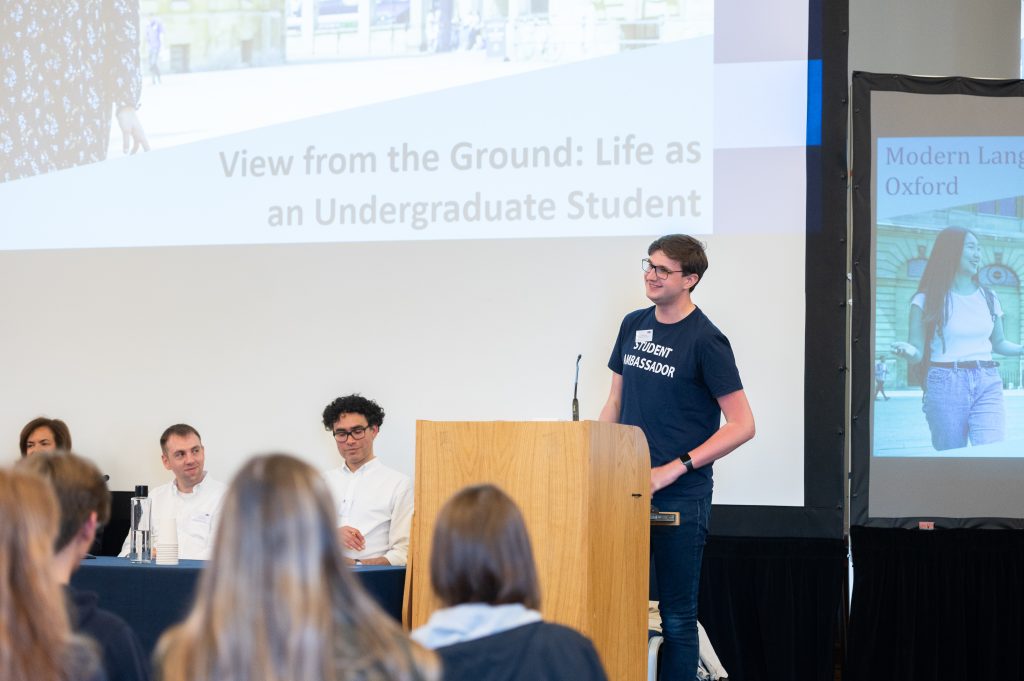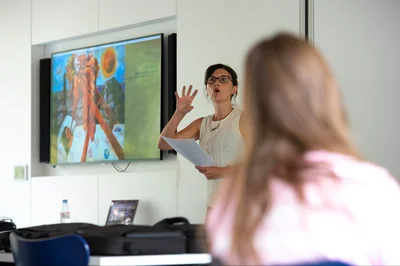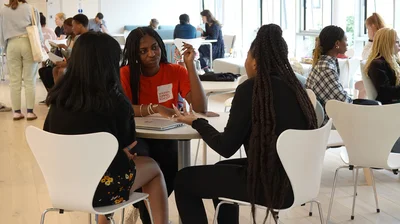Following the publication of the winning and runner up entries, we are excited to present the highly commended entries for the Year 12-13 category of this year’s Spanish Flash Fiction competition!
A huge well done to all our highly commended entrants! Without further ado, ¡venga, vamos!
La Mujer
La estatua está sola en el patio de un palacio, suspendida en piedra para siempre. Su expresión es apacible y sonriente, con los brazos extendidos, su vestido que fluye. La Mujer la llaman, por no tenía nombre. Un símbolo perfecto de la feminidad, de silencio, de los oprimidos.
Antes era diferente. En vida estaba una fuerza de la naturaleza, con los ojosbrillantes de desafío, sus dientes al descubierto de furia incalificable. Sus uñas se hincaron en las palmas, dejaron semilunas en sus estelas; vestido rasgado, ensangrentado. La Bruja la llamaban y la evitaban.
– Romilly De Silva, Year 12
«Tenemos que decirte algo, cariño».
En esta fracción de segundo, mi vida se ha puesto patas arriba. Me senté, chocada por esta revelación. Millones de pensamientos daban vueltas en mi cabeza, y unas lágrimas corrían por mi rostro, como un océano de dolor.
Todo lo que pensé que sabía era una mentira.
Es sorprendente que nunca lo haya adivinado. Los secretos, los papeles ocultos, la falta de fotos de mi infancia. Hubiera debido saber que me escondian algo. Pero nunca en mis sueños me pude imaginar que estaban guardando semejante secreto. El secreto de mi existencia.
Soy un niño robado.
– Meghan Henderson, Year 12
Hay una voz en mi cabeza. Te prometo que no estoy loca- se llama ‘inglés’. A veces ojalá no viviera aquí. Quiero correr de él, pero estamos atrapados juntos. Mientras escribo esto, inglés’ traduce y temo que siempre lo haga. Mi corazón quiere creer que entiendo las palabras y en principio sé lo que significan, pero no las siento. Son un concepto y no una realidad. Son un revoltijo de letras y sonidos que me han dicho que significan algo para alguien, hacen que alguien se sienta algo. Ojalá yo fuera ese alguien pero ‘inglés’ siempre será en mi cabeza.
– Martha Burdon, Year 12
La sopa es una comida complicada. Hay personas que dicen que la sopa tiene todas las respuestas. Dicen que si la miras atentamente, encontrarás las soluciones – ni demasiado cortas, ni demasiado largas. Dicen que la sopa tiene todas las informaciones necesarias. Si necesitas suerte, alegría, esperanza – puedes encontrarlas. Pero en mi sopa solo veo las verduras. No sé qué estoy haciendo mal.
Cada vez que voy al supermercado, busco por todas partes la sopa especial. Encuentro sopa de tomate, sopa de pollo – ¡incluso el gazpacho! Pero no sé dónde encontrar la sopa que necesito. La sopa de letras.
– Lara Horsley, Year 13
¿Ustedes aún han oído?
¿No?, les diré la leyenda de la mujer gitana que conjuró a la luna hasta la madrugada. La gitana rogó a la luna por un hombre gitano hasta que le enviara un cíngaro a condición de que se rindiera su primer hijo, que el gitano engendre, a la luna. Sin embargo, de un padre de piel morena, nació un niño blanco como la nieve fría.
El gitano, al creerse deshonrado, se enfrentó a su mujer y la hirió de muerte con su cuchillo, en las montañas, rindió al niño albino a la luna de plata blanca.
– Charlie Crookes, Year 12
Sancocho
Cuba es un corazón que late, ritmos sincopados de tumbadoras que te llaman a refrescarte en el río que se arremolina en torno a las raíces de tus antepasados.
Los vendedores, gritando sus negocios a través de brillantes olas de calor. Vestigios de nuestra historia, las calles de Camagüey son un respiro mientras todo lo demás se mueve a su alrededor.
Acuno a mi primo mientras se desangra, un agujero en el pecho, su hermano escogió la pelea equivocada.
Aromas de sangre y humo de cigarro, con tintes de cilantro. La sangre caliente empapa la única camisa que tenía, y recuerdo que su madre estaba haciendo sancocho hoy.
– Edith Scott, Year 12
El Caudillo.
Por las calles de Madrid, nos caza. Cruza las playas de Andalucía, nos persigue. En las montañas vascas, nos silencia. Terror, vestido de blanco, nos agarra por la garganta y mientras morimos, por nuestros respiros finales, un último sabor de libertad, su agarre solo se hace más fuerte hasta que todo lo que queda son cadáveres ambulatorios.
Cadáveres desprovistos de autonomía, que sonríen, vistiendo el pretexto de una España en su antiguo esplendor.
– Jack Hussey, Year 12
El orgullo es el diablo
Puede apoderarse de cualquiera. Se acerca sigilosamente como la Serpiente del Edén, susurrándote palabras venenosas al oído. Si lo consigue, uno puede ahogarse en un abismo de aislamiento, para no ser visto nunca más. el sentimiento en el que te deja es la peor parte; una presión brutal como un maremoto que nos traga enteros, y algunos se ahogan en su abrazo. ¿Se ha apoderado de ti el orgullo? ¿Se ha acercado a ti como una llama silenciosa hasta que te encontraste luchando contra un fuego furioso? un fuego que te rodea y te separa del mundo.
– Josiane Kammani, Year 12
La sombra del tiempo perdido
Las temporadas se disipan, de entrada y salida- un tarareo dulce. La madre Tierra es la titiritera controlando cómo crece y mengua la luna; su mano compasiva cuidando la naturaleza. Ya sea el viento invernal, azotando con fuerza hercúlea o la melodía tranquila de los pájaros, compartiendo serenata del verano; la metamorfosis sigue. No podemos frenarla ni acelerarla- lo único seguro, un constante en la vida siempre cambiante. Los días son segundos y los meses, horas- quizás las temporadas son una medida de tiempo del mundo, nos prestan claridad y paz infinita; hasta que dejemos que su alma durmiente descanse.
– Eva Murphy, Year 12
¡ Felicidades a todos!


